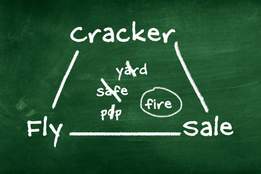Did you ever notice that there are two different ways to pronounce the last syllable of words like beloved or alleged?
The suffix -ed is the way we mark the past participle of many verbs. It always formerly was pronounced as a full syllable. We still hear that full -ed in some words, for phonetic reasons, when a word ends in -ted or -ded, such as wanted and tasted or ended and divided.
Over the centuries, that fully pronounced syllable was reduced to a single sound, /t/ or /d/, in many verbs. In an example of English trimming a sound for efficiency, we no longer hear a vowel in the last syllable of such words, just the /t/ or /d/ as the final sound. There is a phonetic rule we unconsciously follow for this subtle distinction: when the next-to-last syllable of a word ending in -ed is voiced—pronounced with the vocal cords engaged—the -ed is pronounced as a /d/. But when the next-to-last syllable is unvoiced, the -ed is pronounced as /t/.
To hear the difference, say the words buzzed (ends in a /d/ sound) and bussed (ends in a /t/ sound) out loud. If you touch your throat and pronounce the letter /s/ and then the letter /z/, you will feel the difference as you hear it. Voicing is the difference between other consonants as well, like /f/ and /v/ and /p/ and /b/.
We hear /t/ in words like these:
hoped, talked, stopped, jumped, relaxed
We hear /d/ in words like these:
agreed, enjoyed, lived, webbed, snowed
This reduction of sound is also shown in the spelling (without the e) of some verbs with a monosyllabic past tense form, such as sold, bled, bought, leapt, fought. There are a few that are spelled both ways, sometimes in British variants like spelt (for spelled) and spilt (for spilled).
Some adjectives were formed from past participles before the sound of the -ed suffix was reduced, and they retain the older pronunciation with a full syllable for -ed in some contexts:
blessed, learned, aged
These have an archaic or formal character. The addition of the final syllable gives a more official sound to marked and alleged.
Adjectives are sometimes used as nouns in English, and when -ed adjectives are used this way, the final syllable is pronounced and they similarly convey a formal tone, as in “dearly beloved.”
The -ed suffix also creates adjectives out of nouns, which is how words like talented, wooded, wretched, diseased, bigoted, crooked and honeyed were formed. Many of these are seen as the second part of a description, like long-eared, brown-haired, saber-toothed, and blue-eyed.
Finally, some of these words didn’t begin as either a verb or a noun—they were always adjectives in our language, like wicked. And that’s the naked truth.





